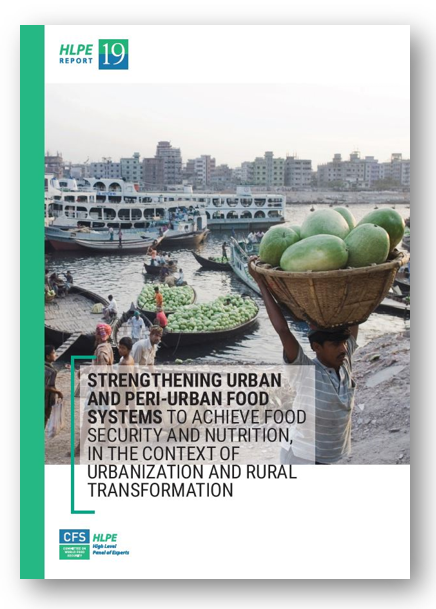
NRI’s Delia Grace Randolph is a co-author of the latest report by the High Level Panel of Experts on Food Security and Nutrition (HLPE-FSN) of the UN Committee on World Food Security. The report ‘Strengthening urban and peri-urban food systems to achieve food security and nutrition, in the context of urbanization and rural transformation’, provides valuable insights into this vital issue as urbanisation continues to transform our world.
The groundbreaking report launched on 2 July at the UN Food and Agriculture Organization headquarters in Rome, challenges prevailing narratives on food insecurity and malnutrition. It shows that 77% (1.7 billion) of food insecure people worldwide live in and around cities – contrary to the common belief that the majority of people affected by food insecurity and malnutrition are found in rural areas.
Such high levels of hunger call for urgent action. Delia Grace, Professor of Food Safety Systems at NRI said: ‘We are becoming an urban species. People move to cities and towns for better lives but too often suffer worse food, housing and environments. This can be fixed by strategic investment and changing how we regulate cities. Especially, the vast informal systems – the “hidden middle” where most urban poor work – must be recognised and improved.’

The report explores various dimensions of food system activities, governance issues, and policy instruments for change and offers a comprehensive analysis of the distinctive challenges and opportunities present in U-PU areas. It presents the latest data, revealing regional and spatial variations. The report also finds that food insecurity affects women more than men, due to differential exposure to shocks as well as disparities in education, entitlements, opportunities and social networks. It shows how these urban regions profoundly shape food systems, influencing production, distribution, and consumption patterns on a global scale. The authors stress the importance of multi-level governance and addressing structural inequalities for food systems transformation.
At the launch, Jane Battersby, lead author of the report, said: ‘This report underscores the urgent need for specific policies to address the complexities of urban food systems and provides a roadmap for policymakers to ensure no one is left behind in our urbanising world.’
Key highlights from the report include:
- Assessment of challenges: the report identifies bottlenecks in achieving food security and nutrition in urban and peri-urban areas, emphasising the need for tailored interventions.
- Linkages with other systems: it explores how urban and peri-urban food systems intersect with water, energy, and mobility systems, crucial for achieving food security and nutrition goals.
- Transformation and equity: strategies for transforming urban food systems to be more equitable, accessible, sustainable, and resilient are discussed.
- Policy recommendations: the report provides action-oriented policy recommendations aimed at policymakers to address the unique challenges of urban and peri-urban food security and nutrition.
Read or download the full report here.

